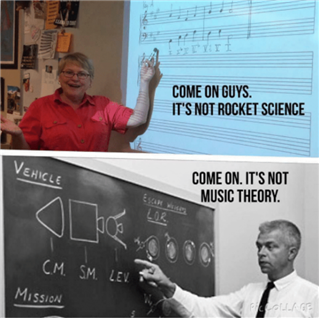Music Theory is an essential part of music. Throughout my near 10 years experience of teaching music theory, students usually found music theory confusing, complicated, and intimidating. My students even created a Discord channel for old and new music theory students to ask questions, share experiences, and hang out. That Discord channel titled “Let’s hate theory!”. But in our first blog post of the school, I would like to share why you need to learn music theory. Hopefully, this will give you some motivation to study music theory.

Music Theory helps you Speak the Same Language as Partners and Collaborators
To explain this, please watch the following video hosted by Jacob Collier in the YouTube Channel WIRED, in which he will explain the concept of harmony in 5 different levels. Jacob Collier is a musician who won multiple Grammy awards, his music often features extensive use of harmony and microtonal music. At the end of the video, Jacob invited another multiple Grammy awards winner and Jazz legend, Herbie Hancock. You can start the video from 8:24 where Jacob is explaining how he thinks harmony works on him. Of cources, I also welcome you watch the whole video.
In this video, Jacob used a lot of music terminology, such as Major 7th, minor 9th, and etc, to describe what he is playing on the keyboard. Understanding music theory will help you speak the same language as your collaborators and partners, you no longer need to say “yeah, that note with that chord…”
Music theory helps you communicate with other musicians what exactly you want in your music or know exactly what notes you need to play.
Learn from History and the Masters

As a musician, you've probably thought about how the legends and great composers wrote their masterpieces and you’ve also probably dreamed of one day you can play music like them or even compose your own masterpieces and become others' inspiration.
The answer is simple: music theory. Music theory is the study of how musicians create and understand music. It's an essential tool for any musician to analyze those masterpieces and understand the technique and secrets behind them. Then you can apply those techniques and secrets to your own compositions.
You will not only be able to better understand music, you will also be able to harness that understanding to make your own music more informed.
When learning about music theory, you are also learning about communication. Music is a language and it's important for musicians (and non-musicians) to speak this language fluently. When you learn how chords work together in a song and how melodies interact with each other, then you can communicate with other musicians or people who understand music in general much easier because they have access to all of these same tools that we have been using since childhood: ear training combined with knowledge of scales and patterns which allow us access through our ears into knowledge beyond what we initially hear!
If you want to be a better musician, then learning Music Theory is a must. It will help you understand music, which in turn will help you make better music. And it’s not just about understanding the language of music—it’s also about knowing how those elements come together to create something new and meaningful. You might be surprised at how much more open-minded and creative you become when armed with this knowledge!

In the end, music theory is not rocket science. It is a set of collective rules for every music that has been composed. Sometimes, I find the grammar of English is more complicated than music theory. From now on, I will occasionally post some music theory related articles. I hope some of you will start loving this underrated language.

Commentaires